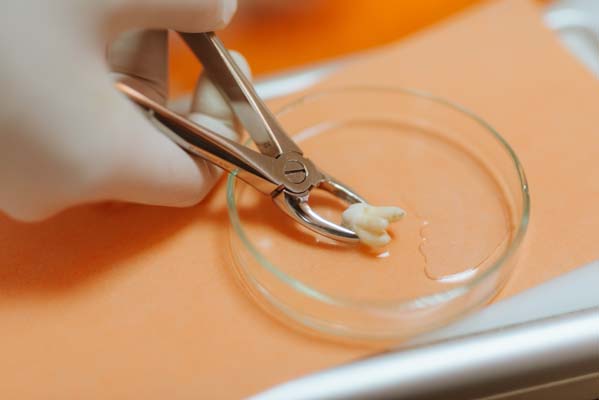A Step-by-step Guide to a Tooth Extraction Procedure
may seem like a scary or daunting procedure, but it’s safe with few potentials for complications. We’re going to go through all the major steps to help put your mind at ease and make you more comfortable about any upcoming procedures.
Step one: applying the anesthetic
First, the dentist will administer an anesthetic. They may use a local anesthetic to numb only the tooth and surrounding tissue, or they may use a general anesthetic, which will put the patient to sleep. Awake patients may still feel some pressure as the dentist loosens the tooth, which is completely normal.
Step two: extracting the tooth
To ready the tooth for extraction, the dentist will use specialized tools called dental elevators. They will elevate the tooth, coaxing it from the jawbone to loosen it. Many different kinds of dental elevators are specialized for specific kinds of teeth. Once the tooth has been sufficiently loosened, the dentist will remove it with forceps. This is called a simple extraction.
If the tooth is impacted, meaning that it has not emerged from the gums, then a different option called a surgical extraction would be used. In this case, the dentist will need to cut into the gums to reach the tooth. The dentist may need to cut the tooth into pieces to remove it more easily. Patients should not feel any pain.
Step three: post-surgical Care
After the tooth extraction, patients will bite down on the gauze for about 30 minutes. This will generate pressure which will help to form a blood clot. If necessary, a dentist will also stitch any incisions. If the stitches are self-dissolving, then patients will not need to return to get them removed later. If general anesthesia was applied, the patient must wait in the dentist’s care until it is safe to leave, and they may not drive. Before leaving, the dentist will give any necessary instructions to the patient.
Step Four: Post-surgical Recovery
There may be some discomfort in the days following the surgery. It is important to rest and allow your body time to heal. If needed, over-the-counter medications such as Ibuprofen or other NSAIDs should be taken as needed to help manage the pain.
Several important guidelines recovering patients should follow. They should only eat soft foods and liquids for the first 24 hours, they should not brush their teeth for 24 hours, and they should not use a straw or chew on the same side of their mouth as the extraction site for several days. If these guidelines are not followed, it is possible to dislodge the blood clot, exposing the bone and tissue below. This leads to a painful condition called dry socket. Patients experiencing dry sockets should let their dentists know as soon as possible to get it resolved.
Patients should be starting to feel better after a few days, but it might take up to a couple of weeks for the wound to close entirely, and it might also take up to three months for the tissue around the tooth extraction site to completely heal.
Request an appointment here: https://okamotoandbigleydentistry.com or call Okamoto and Bigley Dentistry at (626) 472-2178 for an appointment in our Pasadena office.
Check out what others are saying about our dental services on Yelp: .
Related Posts
While a dental extraction is typically the last resort, people may not be aware of how necessary it can be on a regular basis. Okamoto and Bigley Dentistry will always strive to preserve the health and beauty of your natural teeth and avoid the extraction altogether. However, we must utilize treatment methods that can save…
If you have a dental extraction at Okamoto and Bigley Dentistry, it is important for you to realize that we perform this procedure on a regular basis. Since most people do not have room for a third set of molars, we perform an extraction on patients of various ages. They can come in sideways or…
We may have to consider tooth extractions if teeth have enough damage. Call us for more details.While tooth extraction is not our first option for treating infected teeth, it may become necessary in certain situations. Regardless, we will numb the area around the tooth so you will not feel any pain.Tooth ExtractionAt Okamoto and Bigley…
In modern society, it is almost a rite of passage to have a wisdom tooth extraction as a young adult. Wisdom teeth, the final, permanent molars located in the very back of the mouth, can actually cause problems for many patients if they are not removed. Fortunately, in most cases, the procedure is minimally invasive…
